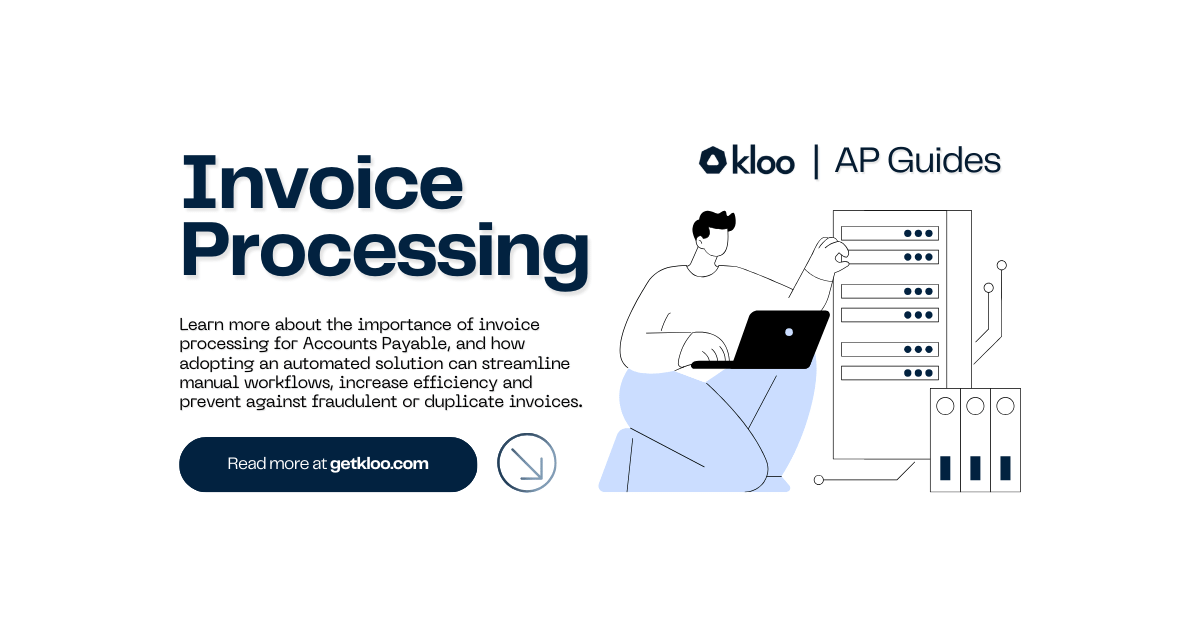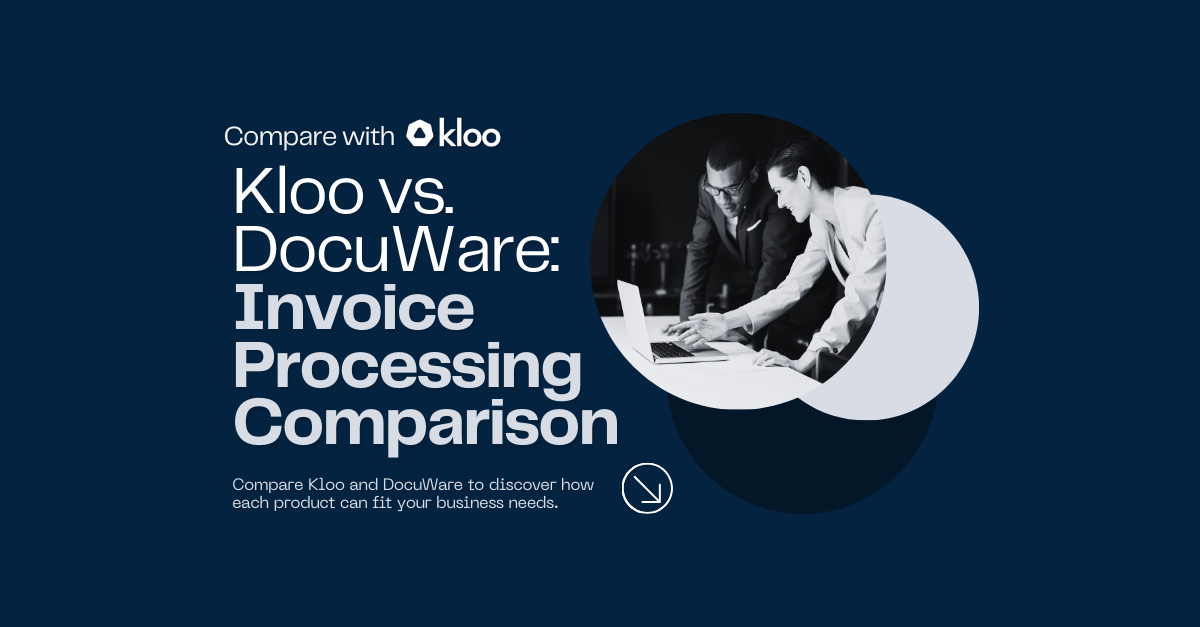Everything You Need to Know about Invoice Processing

Invoice processing is a critical component of the Accounts Payable (AP) function. Traditional methods often entail significant time, effort, and human resources. Leveraging advanced technologies and automation can enhance invoice processing, providing substantial benefits to businesses. Let's dive into the importance of efficient invoice processing and how Kloo employs AI and smart automation to optimise this essential task.
Contents:
- What is invoice processing?
- Common challenges with traditional invoice processing
- How do I automate invoice processing?
- Benefits of automated invoice processing
- What to look for in an invoice processing solution
- How Kloo automates invoice processing
What is Invoice Processing?
Invoice processing is the series of steps a company undertakes to handle vendor invoices from receipt to payment. This process ensures that businesses pay for goods and services accurately and timely, maintaining strong vendor relationships and financial control. Effective invoice processing involves:
- Verifying invoice details
- Matching invoices to purchase orders and delivery receipts
- Approving invoices for payment
- Recording the transaction in the accounting system
Proper invoice processing is crucial for avoiding errors, preventing fraud, and ensuring timely payments, thereby supporting the overall financial health of an organisation.
Common Challenges in Invoice Processing
Invoice processing can present various challenges, particularly in traditional, manual systems:
- Data Entry Errors: Manual data entry is prone to mistakes, leading to discrepancies and potential payment issues.
- Fraud and Duplicate Payments: Without thorough checks, companies risk falling victim to fraudulent invoices or making duplicate payments.
- Inefficiency: Manual processing is time-consuming, often resulting in delayed payments and strained vendor relationships.
- High Operational Costs: The labour-intensive nature of manual processing increases operational costs and reduces overall efficiency.
These challenges highlight the need for automated solutions to enhance accuracy, efficiency, and security in invoice processing.
How to Automate Invoice Processing
Automation in invoice processing involves using technology to handle repetitive tasks, reduce errors, and streamline the entire workflow. Key approaches include:
Optical Character Recognition (OCR)
OCR technology converts different types of documents, such as scanned paper documents, PDF files, or images captured by a digital camera, into editable and searchable data. In invoice processing, OCR can:
- Automatically extract and capture invoice data
- Reduce manual data entry errors
- Accelerate the processing time
You can find out everything you need to know about OCR for invoices in our essential guide here.
AI and Machine Learning
AI and machine learning technologies enhance invoice processing by:
- Identifying patterns and anomalies in invoice data
- Setting up invoice approval workflows for streamlines operations
- Matching invoices to purchase orders and delivery receipts
- Predicting and flagging potential fraud or duplicate invoices
Integrating with ERP Systems
Integrating automated invoice processing tools with existing ERP systems ensures seamless data flow and consistent record-keeping. Key integration strategies include:
- Real-time data sharing: Automated tools should facilitate real-time data sharing with ERP systems to maintain up-to-date financial records.
- Seamless workflows: The integration should support a smooth workflow from invoice receipt to payment approval and recording.
Benefits of Automated Invoice Processing
Automating invoice processing offers numerous advantages:
Enhanced Efficiency: Automated systems allow for repetitive tasks to be completed quickly and accurately, significantly reducing the time required for invoice processing. This efficiency allows employees to focus on higher-value tasks, improving overall productivity.
Error Reduction: Automation minimises human errors in data entry and matching processes, ensuring higher accuracy in invoice handling and reducing the risk of discrepancies.
Fraud Prevention: Automated systems with AI capabilities can detect unusual patterns and flag potentially fraudulent or duplicate invoices for manual verification, providing an added layer of security. This further ensures protection over your invoice data without the need for extra manual work.
Cost Savings: By reducing the need for manual intervention and streamlining processes, automation lowers operational costs associated with invoice processing and with costly transformation projects.
Improved Vendor Relationships: Timely and accurate payments facilitated by automation enhance vendor relationships, potentially leading to better contract terms and early payment discounts.
What to look for in an Invoice Processing Solution
1. Comprehensive Automation: Look for solutions that offer robust automation capabilities over the entire process from receipt to payment. Automation reduces manual data entry, minimises errors, and accelerates the entire process from receipt to payment. By converting various document formats into editable and searchable data, OCR technology significantly enhances the speed and accuracy of data extraction.
2. Efficient Workflow Management: Having effective invoice approval workflows in place is crucial for streamlining the approval process. Choose solutions that provide customisable workflows, ensuring invoices are promptly routed to the appropriate personnel. This helps prevent bottlenecks and delays in the payment cycle, leading to a more efficient operation.
3. Advanced Scanning and Integration: Ensure the solution includes advanced scanning functions capable of high accuracy in data capture. This feature is essential for converting paper invoices into digital formats, allowing for easier storage, retrieval, and processing. Additionally, the software should integrate seamlessly with your existing systems, supporting batch scanning to handle large volumes of invoices efficiently.
By focusing on these features, businesses can select an invoice processing solution that enhances efficiency, reduces errors, and speeds up the payment process, ultimately contributing to better financial management and operational efficiency.
How Kloo Automates Invoice Processing
Kloo leverages advanced technologies to transform invoice processing, offering a comprehensive solution that enhances efficiency, accuracy, and security. Key features of Kloo's approach include:
Automated Data Extraction: Kloo uses OCR and generative AI to automate the extraction and coding of invoice data. This process begins immediately upon invoice upload, significantly reducing processing time and minimising human error.
AI-Powered Matching: Kloo employs AI-powered matching to compare invoices with purchase orders and delivery receipts. This sophisticated matching process accounts for nuances in data, ensuring accurate verification even when document formats vary.
Fraud and Duplicate Detection: Kloo's advanced algorithms detect and flag suspicious, potentially fraudulent, or duplicate invoices, enhancing financial control and security.
Seamless Integration: Kloo integrates seamlessly with existing ERP and accounting systems, enabling real-time data sharing and maintaining consistent financial records.
By incorporating these advanced technologies, Kloo not only streamlines invoice processing but also ensures it is more secure and less prone to errors. Companies using Kloo can expect a robust system that supports dynamic financial management, enabling them to focus on strategic business growth.
Key Takeaways
Automating invoice processing is essential for maintaining accuracy and efficiency in AP operations. As transaction volumes grow, manual methods become increasingly impractical. Automation, particularly with AI and advanced technologies, offers substantial benefits, including reduced error rates, enhanced fraud detection, and improved operational efficiency.
Kloo's innovative approach to invoice processing exemplifies how automation can transform financial workflows, strengthen vendor relationships, and position businesses for scalability and financial governance. Embracing automated invoice processing is a strategic move for any organisation seeking to optimise its financial operations and maintain a competitive edge in today's dynamic market.
Let's get started

